งูเหลือม (สกุล)
| งูเหลือม ช่วงเวลาที่มีชีวิตอยู่: Miocene–Present | |
|---|---|
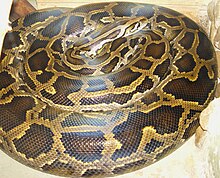
| |
| งูหลาม (Python bivittatus) | |
| การจำแนกชั้นทางวิทยาศาสตร์ | |
| โดเมน: | ยูแคริโอตา Eukaryota |
| อาณาจักร: | สัตว์ Animalia |
| ไฟลัม: | สัตว์มีแกนสันหลัง Chordata |
| ชั้น: | สัตว์เลื้อยคลาน |
| อันดับ: | กิ้งก่าและงู |
| อันดับย่อย: | งู Serpentes |
| วงศ์: | วงศ์งูเหลือม |
| สกุล: | Python Daudin, 1803 |
| ชนิดต้นแบบ | |
| Python molurus[ต้องการอ้างอิง] Linnaeus, 1758 | |
| ชื่อพ้อง | |
|
รายการ
| |
งูเหลือม หรือ งูหลาม เป็นสกุลของงูไม่มีพิษในวงศ์งูเหลือม (Pythonidae) ใช้ชื่อสกุลว่า Python (/ไพ-ธอน/) อาศัยอยู่ในเขตร้อนและบริเวณกึ่งเขตร้อนในซีกโลกตะวันออก[1]
ชื่อ python ได้รับการเสนอโดย François Marie Daudin ใน ค.ศ. 1803 ใช้เรียกงูเหลือมไม่มีพิษ[2] ปัจจุบันมีงูเหลือมชนิดที่ได้รับการยอมรับเป็นลำดับขั้นที่ถูกต้อง 10 ชนิด[3]
อนุกรมวิธาน
[แก้]ใน ค.ศ. 1993 มีงูเหลือมที่ได้รับการยอมรับเป็นลำดับขั้นที่ถูกต้อง 7 ชนิด[4] เมื่อตามการวิเคราะห์วิวัฒนาการชาติพันธุ์ มีงูเหลือมที่ได้รับการยอมรับระหว่าง 7 ถึง 13 ชนิด[5][6]
| ชนิด | ภาพ | บัญชีแดงไอยูซีเอ็นและขอบเขตทางภูมิศาสตร์ |
|---|---|---|
| งูหลามอินเดีย (P. molurus; Linnaeus, 1758)[7] | 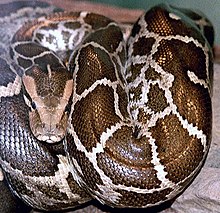
|
NT[8]
|
| งูหลามแอฟริกา (P. sebae; Gmelin, 1788)[9] | 
|
NT[10] Range shown in green |
| งูหลามบอล (P. regius; Shaw, 1802)[11] | 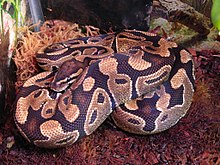
|
NT[12]
|
| งูหลาม (P. bivittatus; Kuhl, 1820)[13] | 
|
VU[14]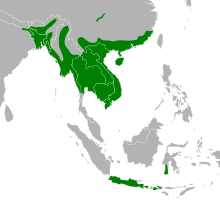
|
| Southern African rock python (P. natalensis; Smith, 1833)[15] | 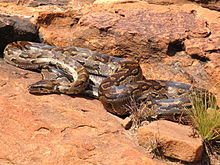
|
LC[16] ขอบเขตอยู่ในสีส้ม |
| งูหลามปากเป็ด (P. curtus; Schlegel, 1872)[17] | 
|
LC[18]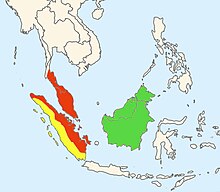 ขอบเขตอยู่ในสีเหลือง |
| Bornean python (P. breitensteini; Steindachner, 1881)[19] | 
|
LC[20] ขอบเขตอยู่ในสีเขียว |
| Angolan python (P. anchietae; Bocage, 1887) | 
|
LC[21]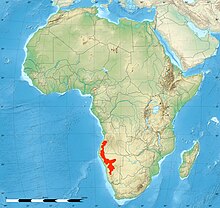 [21] [21]
|
| Blood python (P. brongersmai; Stull, 1938) (อดีต P. curtus brongersmai) | 
|
LC[22] ขอบเขตอยู่ในสีแดง |
| Myanmar short-tailed python (P. kyaiktiyo; Zug, Gotte & Jacobs, 2011)[23] | 
|
VU[24] ทางตะวันตกของเทือกเขาตะนาวศรี ประเทศพม่า[24] |
| † งูเหลือมยุโรป (Python europaeus; Szyndlar & Rage, 2003)[25] | EX
ชนิดสูญพันธุ์ที่รู้จักจากการค้นพบกระดูกสันหลังส่วนลำตัวที่มีอายุถึงยุคไมโอซีน พบที่ Vieux-Collonges กับ La Grive-Saint-Alban ประเทศฝรั่งเศส[25] |
ที่อยู่อาศัย
[แก้]
ในทวีปแอฟริกา สามารถพบงูเหลือมในเขตร้อนตอนใต้ของทะเลทรายสะฮารา แต่ไม่พบในบริเวณปลายตะวันตกเฉียงใต้สุดของแอฟริกาตอนใต้ (จังหวัดเวสเทิร์นเคป) หรือในเกาะมาดากัสการ์ ส่วนในทวีปเอเชียพบในบริเวณตั้งแต่บังกลาเทศ เนปาล อินเดีย ปากีสถาน และศรีลังกา (รวมหมู่เกาะนิโคบาร์) ผ่านพม่า ทางตะวันออกถึงอินโดจีน จีนตอนใต้ ฮ่องกง และมณฑลไหหลำ และในมาเลเซีย อินโดนีเซีย กับฟิลิปปินส์[1]
รุกราน
[แก้]มีบางคนเสนอแนะว่างูเหลือมสายพันธุ์ P. bivittatus และ P. sebae มีศักยภาพที่จะเป็นสายพันธุ์รุกรานที่เป็นปัญหาได้ในรัฐฟลอริดาใต้[26]
ศัพทมูลวิทยา
[แก้]คำว่า Python มาจากศัพท์ภาษาละตินว่า 'pȳthon' และจากศัพท์ภาษากรีกว่า 'πύθων' ทั้งสองคำสื่อถึง "งูที่ถูกสังหาร ซึ่งมีชื่อในเรื่องเล่าว่าไพธูส (Pytheus)..."[27]
อ้างอิง
[แก้]- ↑ 1.0 1.1 McDiarmid, R. W.; Campbell, J. A.; Touré, T. (1999). "Python". Snake Species of the World: A Taxonomic and Geographic Reference. Volume 1. Washington, DC: Herpetologists' League. ISBN 1893777014.
- ↑ Daudin, F. M. (1803). "Python". Histoire naturelle, générale et particulière, des reptiles. Tome 8. Paris: De l'Imprimerie de F. Dufart. p. 384.
- ↑ Barker, D. G.; Barker, T. M.; Davis, M. A.; Schuett, G. W. (2015). "A review of the systematics and taxonomy of Pythonidae: an ancient serpent lineage". Zoological Journal of the Linnean Society. 175 (1): 1−19. doi:10.1111/zoj.12267.
- ↑ Kluge, A. G. (1993). "Aspidites and the phylogeny of pythonine snakes". Records of the Australian Museum (Supplement 19): 1–77.
- ↑ Lawson, R.; Slowinski, J. B.; Burbrink, F. T. (2004). "A molecular approach to discerning the phylogenetic placement of the enigmatic snake Xenophidion schaeferi among the Alethinophidia". Journal of Zoology. 263 (3): 285–294. doi:10.1017/s0952836904005278.
- ↑ Reynolds, R. G.; Niemiller, M. L.; Revell, L. J. (2014). "Toward a tree-of-life for the boas and pythons: multilocus species-level phylogeny with unprecedented taxon sampling". Molecular Phylogenetics and Evolution. 71 (71): 201–213. doi:10.1016/j.ympev.2013.11.011. PMID 24315866.
- ↑ Linnaeus, C. (1758). "Coluber molurus". Systema naturae per regna tria naturae: secundum classes, ordines, genera, species, cum characteribus, differentiis, synonymis, locis. Vol. 1 (Tenth reformed ed.). Holmiae: Laurentii Salvii. p. 225.
- ↑ Aengals, A.; Das, A.; Mohapatra, P.; Srinivasulu, C.; Srinivasulu, B.; Shankar, G. & Murthy, B.H.C. (2021). "Python molurus". IUCN Red List of Threatened Species. 2021: e.T58894358A1945283. สืบค้นเมื่อ 2 December 2021.
- ↑ Gmelin, J. F. (1788). "Coluber sebae". Caroli a Linné. Systema naturae per regna tria naturae: secundum classes, ordines, genera, species, cum characteribus, differentiis, synonymis, locis. Vol. I, Part III (13., aucta, reformata ed.). Lipsiae: Georg Emanuel Beer. p. 1118.
- ↑ Alexander, G.J.; Tolley, K.A.; Penner, J.; Luiselli, L.; Jallow, M.; Segniagbeto, G.; Niagate, B.; Howell, K.; Beraduccii, J.; Msuya, C.A. & Ngalason, W. (2021). "Python sebae". IUCN Red List of Threatened Species. 2021: e.T13300572A13300582. สืบค้นเมื่อ 2 December 2021.
- ↑ Shaw, G. (1802). "Royal Boa". General zoology, or Systematic natural history. Volume III, Part II. London: G. Kearsley. pp. 347–348.
- ↑ D'Cruze, N.; Wilms, T.; Penner, J.; Luiselli, L.; Jallow, M.; Segniagbeto, G.; Niagate, B. & Schmitz, A. (2021). "Python regius". IUCN Red List of Threatened Species. 2021: e.T177562A15340592. สืบค้นเมื่อ 2 December 2021.
- ↑ Kuhl, H. (1820). "Python bivittatus mihi". Beiträge zur Zoologie und vergleichenden Anatomie. Frankfurt am Main: Verlag der Hermannschen Buchhandlung. p. 94.
- ↑ Stuart, B.; Nguyen, T.Q.; Thy, N.; Grismer, L.; Chan-Ard, T.; Iskandar, D.; Golynsky, E. & Lau, M.W. (2019) [errata version of 2019 assessment]. "Python bivittatus". IUCN Red List of Threatened Species. 2019: e.T193451A151341916. สืบค้นเมื่อ 6 April 2021.
- ↑ Smith, A. (1849). "Python natalensis". Illustrations of the zoology of South Africa : consisting chiefly of figures and descriptions of the objects of natural history collected during an expedition into the interior of South Africa, in the years 1834, 1835, and 1836; fitted out by "the Cape of Good Hope Association for exploring Central Africa" : together with a summary of African zoology, and an inquiry into the geographical ranges of species in that quarter of the globe. London: Smith, Elder and Co. pp. 42–44.
- ↑ Alexander, G.J. & Tolley, K.A. (2021). "Python natalensis". IUCN Red List of Threatened Species. 2021: e.T13300560A13300564. สืบค้นเมื่อ 19 April 2022.
- ↑ Schlegel, H. (1872). "De Pythons". ใน Witkamp, P. H. (บ.ก.). De Diergaarde van het Koninklijk Zoölogisch Genootschap Natura Artis Magistra te Amsterdam: De Kruipende Dieren. Amsterdam: Van Es. pp. 53–54.
- ↑ Inger, R.F.; Iskandar, D.; Lilley, R.; Jenkins, H. & Das, I. (2014). "Python curtus". IUCN Red List of Threatened Species. 2014: e.T192244A2060581. สืบค้นเมื่อ 2 December 2021.
- ↑ Steindachner, F. (1880). "Über eine neue Pythonart (Python breitensteini) aus Borneo". Sitzungsberichte der Kaiserlichen Akademie der Wissenschaften Wien. 82: 267−280.
- ↑ Inger, R.F.; Iskandar, D.; Lilley, R.; Jenkins, H.; Das, I. (2012). "Python breitensteini". IUCN Red List of Threatened Species. 2012: e.T192013A2028005. สืบค้นเมื่อ 2 December 2021.
- ↑ 21.0 21.1 Baptista, N.; Becker, F.; Conradie, W.; Bauer, A.M. & Ceríaco, L.M.P. (2021). "Python anchietae". IUCN Red List of Threatened Species. 2021: e.T177539A120594491. สืบค้นเมื่อ 2 December 2021.
- ↑ Grismer, L. & Chan-Ard, T. (2012). "Python brongersmai". IUCN Red List of Threatened Species. 2012: e.T192169A2050353. doi:10.2305/IUCN.UK.2012-1.RLTS.T192169A2050353.en. สืบค้นเมื่อ 13 March 2018.
- ↑ Zug, G. R.; Gotte, S. W.; Jacobs, J. F. (2011). "Pythons in Burma: Short-tailed python (Reptilia: Squamata)". Proceedings of the Biological Society of Washington. 124 (2): 112−136. doi:10.2988/10-34.1. S2CID 86424371.
- ↑ 24.0 24.1 Wogan, G. & Chan-Ard, T. (2012). "Python kyaiktiyo". IUCN Red List of Threatened Species. 2012: e.T199854A2614411. doi:10.2305/IUCN.UK.2012-1.RLTS.T199854A2614411.en. สืบค้นเมื่อ 13 March 2018.
- ↑ 25.0 25.1 Szyndlar, Z.; Rage, J. C. (2003). "Python europaeus". Non-erycine Booidea from the Oligocene and Miocene of Europe. Kraków: Institute of Systematics and Evolution of Animals. pp. 68−72.
- ↑ "Python Snakes, An Invasive Species In Florida, Could Spread To One Third Of US". ScienceDaily. 2008. สืบค้นเมื่อ 2017-08-01.
- ↑ Lewis, C. T.; Short, C. (1879). "Pȳthon". A Latin Dictionary. Oxford: Clarendon Press.
